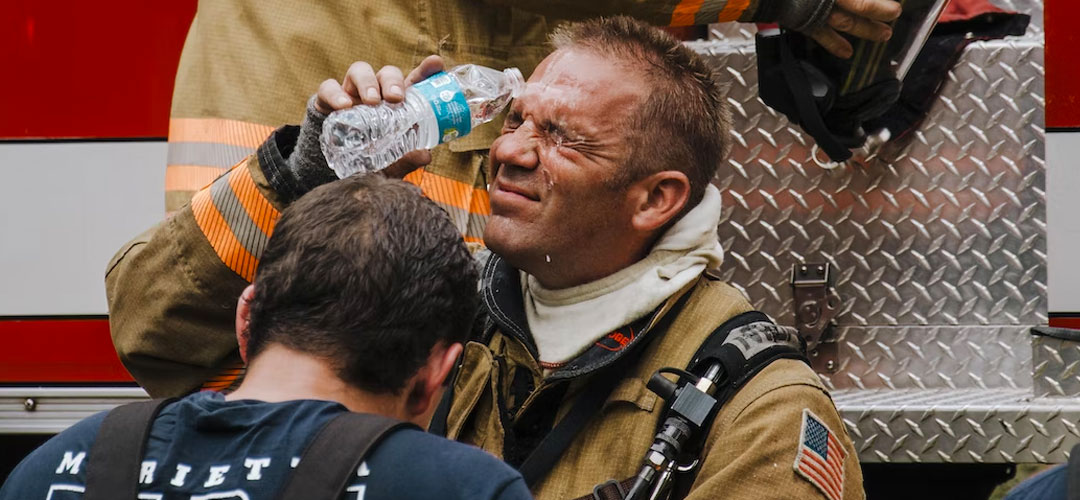
While ALL of us are certainly burnt out over the pandemic and life not getting back to full normal yet, not all of us had to – or continue to — work straight through the crisis, putting our own health and the health of our families on the line.
In the past, “essential” meant people who worked in critical services such as medical, fire, police, paramedics, and the like.
The COVID-19 pandemic of 2020 and 2021 certainly brought new, expanded meaning to the definitions of essential worker and essential business.
Many found themselves thrown into that category whether they wanted it or not. Gas station attendants, grocery workers, pharmacy techs, social service workers, workers in manufacturing and retail, and even liquor store workers joined the ranks of the medical and safety personnel.
And most found challenges thrust on them in one of the most stressful times in recent history.
They faced new and increased work duties and mandatory overtime with no paid time off due to lack of staffing.
They had fears of getting sick with the virus and bringing it home to their loved ones.
Anxiety escalated from finding themselves enforcers of new mandates and protocols, facing customer backlash (and even potential physical harm), having to wear masks 8-, 10-, or 12-hour shifts and working these shifts straight through with little to no breaks, and having to social distance from coworkers and customers through it all.
High rates of burn out for these workers is no surprise. The Kaiser Family Foundation polled adults in the US in July 2020 and 53% said their mental health was negatively affected by the virus related to worry and stress, compared to only 32% reporting that in March. And in August of 2020, Eagle Hill Consulting did a national poll and found 58% of US workers reported burnout, compared to 45% in April 2020 at the beginning of the pandemic. More workers identified their burnout to Covid-19 at 35% compared to 25% in the previous poll.
Organizations providing critical social services to the community, such as hunger organizations like Making A Difference Foundation, also were deemed essential.
Social work and helping the public in such a capacity is rewarding work, but can also be high burnout work. Oftentimes, these employees are dealing with people who are going through some of the toughest points in their lives. People who go into social and nonprofit sectors do so to help others yet often end up neglect their own needs in this line of work. Compassionate hearts love helping, yet it can take its toll even in better times. In a pandemic, burnout is an even greater risk.
Not only do people in social work have to now face the pandemic challenges, they do so on top of an already emotional and difficult job in a field with long hours, typically high employee turnover rates, and lower wages.
As the pandemic continues with the threat of the Omicron variant and worker shortages, what can we collectively do to help these essential workers?
- Always be kind! Live by the Golden Rule, “Do unto others as you would have them do unto you.” There is no reason to be mean, even if you feel frustrated and stressed out yourself. None of us know what another person may be going through at any given moment; a kind word or gesture is what we all need right now, especially these essential workers.
- Be grateful, for without the essential workers and businesses, we would not be able to get many of our necessities — our food and other groceries and goods, have our medical needs attended to, get our prescriptions, and stay safe from crime and emergencies. Essential workers, regardless of industry, help keep society open and moving!
- If you can, when receiving services like food deliveries, or when you go out or order take out at restaurants, tip well to show your support and appreciation. These are typically low paying jobs anyway, and made even more stressful during this time.
- Follow the guidelines, mandates, and even the businesses’ rules. You may not like them or agree with them, but the employees who have to carry out or enforce these rules aren’t the ones making them and it is part of their job to let customers know what they are and abide by them.
- Be patient and know they are doing their best under tough conditions. Yes, lines might be longer, there might not be enough stock on the items you need to purchase, or you might not get the customer attention and service you are used to getting. But remaining patient will serve everyone a lot better than getting mad and taking it out on workers who have no control over the circumstances.
- Remember we are all in this together! Taking care of each other and supporting one another is how we will get through this COVID-19 pandemic!

